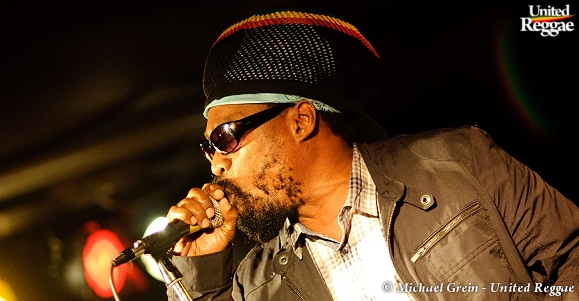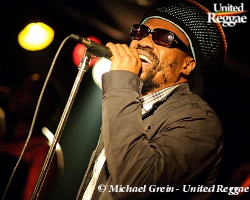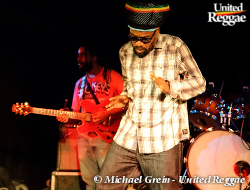Articles about reggae music, reviews, interviews, reports and more...
Interview: Michael Rose
- Home
- Articles
- Interviews
- Interview: Michael Rose

Interview: Michael Rose
"I’m a singer that always tries to create. I try to always be futuristic and always advanced on a level"
Sampler
Few veteran artists can claim to have stayed as popular or as current as Waterhouse’s Michael Rose. Despite becoming one of the biggest and best loved reggae artists in the world during the late seventies and eighties in the harmony group Black Uhuru, he has never been one to rest on his laurels. In an extraordinary journey through the ages of successful Jamaican popular music Rose has travelled from recording Black Uhuru’s first album 'Love Crisis' with Prince Jammy, to topping the Jamaican and international charts voicing for Jammy’s son John John. Angus Taylor spoke to a rather sleepy sounding legend, prior to the Manchester date of his UK tour with Andrew Tosh and the Rasites, about his latest album 'Kingston 11' and how he keeps ahead of the game…

On your European tour you’ve been showcasing new material from your forthcoming album 'Kingston 11'. What can your fans expect when it is released?
The album is quite surprising because the level of 'Kingston 11' is a different range from what I normally do. It’s more a dance music, dancehall kind of vibe but it doesn’t lose its roots. It’s with John John, who is King Jammys’ son and I’ve also worked with his brothers like Jam2 and BabyG.
So a similar partnership to Busy Signal on his second album 'Loaded'?
Yes, yes. The tracks were recorded with John John and Demarco.
The title references the postcode you came from. Why did the time feel right to remind us of your roots?
Yes, as the song Real Jamaican says “Waterhouse mi born an grow”. If you notice what is happening in the inner city of Kingston 11, there is a lot of war going on with the young youths which has sprung up at this time. So I just neutralised myself to be open to give this new energy to get them educated to a new way of life. To change their every day living on the gun.
One of the songs you’ve been playing on stage is your Jamaican number one Shoot Out. Is this a comment on the recent violence in Jamaica such as the extradition of Dudus?
Oh yes, because it is a shoot out. But with the young youths anywhere in the world today, once they clash with the police it’s a shoot out, even in America. So, yes the song relates to what is really happening in Jamaica right now. The problem is I’ve been on tour so I don’t really know exactly what’s going on. I just hear stuff and sometimes it doesn’t do any good to just say what you hear. If I was there now it would be different but I was on the road when everything took place.
 When the song Shoot Out came out a lot of people didn’t know it was me!
When the song Shoot Out came out a lot of people didn’t know it was me!
How have you managed to stay so successful through the decades from voicing for Jammy to voicing for his son?
Well, it’s just that I’m a singer that always tries to create. In my singing when I do it I try to always be futuristic and always advanced on a level. Because when the song Shoot Out came out a lot of people didn’t know it was me! Not even the youths who are in school. Because sometimes in the day when they’d see me they’d say “That’s the man who sing the song!” but they don’t even know that this man was around a long time ago! (laughs)
A lot of people perceive the dancehall music you make now as being very different from the foundation music you made before with, say, Sly & Robbie. Are they wrong?
No, they’re not really wrong because it’s a different level. Listen, no disrespect to Sly & Robbie, they are geniuses at what they do.  But Shoot Out was number one for 28 weeks in the British reggae chart, number one in Germany for months, number one in Switzerland, number one in Italy, Spain, Portugal, France, number one in Japan on the national chart. It was number one in Canada, number one in Boston, and the remix with Junior Going went number one in Miami in the big charts, and of course it was number one in Jamaica and the Caribbean islands. Also, the video was rated “Best Video for ’08” and I think it even won an award for the guy who made it. So it’s no disrespect to the foundation base like with Sly & Robbie, Island Records and Mr Blackwell or whoever, you get me? It’s number one which means the kids of today like the music everywhere in the world. I don’t even know if John John knew what he had in his lap when we made Shoot out! (laughs) Since the big hit with Damian Marley – I’m not talking about the remix now I mean the hotstepper Ini Kamoze thing.
But Shoot Out was number one for 28 weeks in the British reggae chart, number one in Germany for months, number one in Switzerland, number one in Italy, Spain, Portugal, France, number one in Japan on the national chart. It was number one in Canada, number one in Boston, and the remix with Junior Going went number one in Miami in the big charts, and of course it was number one in Jamaica and the Caribbean islands. Also, the video was rated “Best Video for ’08” and I think it even won an award for the guy who made it. So it’s no disrespect to the foundation base like with Sly & Robbie, Island Records and Mr Blackwell or whoever, you get me? It’s number one which means the kids of today like the music everywhere in the world. I don’t even know if John John knew what he had in his lap when we made Shoot out! (laughs) Since the big hit with Damian Marley – I’m not talking about the remix now I mean the hotstepper Ini Kamoze thing.
 No disrespect to the foundation base like with Sly & Robbie, Island Records and Mr Blackwell, but it’s number one which means the kids of today like the music everywhere in the world
No disrespect to the foundation base like with Sly & Robbie, Island Records and Mr Blackwell, but it’s number one which means the kids of today like the music everywhere in the world
Welcome To Jamrock?
Yes, well Shoot Out is the biggest thing after Damian.
These days, Jamaican music uses all kinds of rhythms. Do you think the one drop still has its place?
Yes, it still has its place. Even on 'Kingston 11' we still have one drop rhythms for the album. We have songs like Feed The Children. To everyone reading you can check out this and other new songs at www.myspace.com/mykalrose1
Now as well as collaborating with young talent in Jamaica like Damian and Busy Signal you’ve also worked with Europe’s talent in the form of Alborosie…
Yes, just like back in the day I did collaborations with Maxi Priest with Lion In The Jungle. With Alborosie I did Waan The Ting and Guess Who’s Coming For Dinner which was number one in The Netherlands and Denmark and these places. As a producer he’s also really good. He’s my friend and I can only tell you good things about him. He’s helping to make the one drop maintain right now so he comes with the old Tubbys kind of thing. He’s good man. He’s a good person.
Who haven’t you collaborated with yet? Who’s on your radar?
A lot of people… (pauses) Mick Jagger! (laughs) Because back in the day with Black Uhuru our first big opportunity in a big arena was Wembley Stadium with the Rolling Stones. So if I could do a collaboration with Mick Jagger I would really appreciate this one.
 If I could do a collaboration with Mick Jagger I would really appreciate this one
If I could do a collaboration with Mick Jagger I would really appreciate this one
And of course Andrew Tosh’s father Peter got to do a song with Mick so why not you?
Yes, yes! And I remember we were the only group that got an encore supporting the Rolling Stones at that time. Because when people come to see the Stones they threw stuff! They threw everything – chairs, paper cups, anything – because they just want to see the Stones! But we got an encore at Wembley!
Finally, what in your opinion makes Jamaican music so popular around the world?
 The world right now is Babylon system and you know Babylon, they’re full of shit. They’re full of it like that. Reggae has substantial energy that releases pressures from the people’s mind. So when they listen to our music it keeps them good. It’s like how some people relate to drugs or relate to rum - it helps them to forget something. When they listen to our music they forget the pressures of life in the world.
The world right now is Babylon system and you know Babylon, they’re full of shit. They’re full of it like that. Reggae has substantial energy that releases pressures from the people’s mind. So when they listen to our music it keeps them good. It’s like how some people relate to drugs or relate to rum - it helps them to forget something. When they listen to our music they forget the pressures of life in the world.
But with a song like Shoot Out you are also confronting the realities of life aren’t you? You’re not just offering an escape from the pressures of life.
No, no, no. They’re not escaping from the pressures. But you see it’s for the young youths who don’t listen. This sort of song is directly for the young youths who don’t listen to their parents. They are the ones who we have to focus on right now. The ones who are growing up and don’t listen when their mom says, “I don’t think you should be going out tonight” and they say, “Oh yeah? I’m gone”. Then they’re gone because they don’t listen and they end up with the gun. They’re the ones. I am catering right now for the youths who are growing up and don’t know the dangers of life.
 I am catering right now for the youths who are growing up and don’t know the dangers of life
I am catering right now for the youths who are growing up and don’t know the dangers of life
Read more about this topic
Comments actually desactivated due to too much spams
Browse by categories
Recommended Articles
Latest articles
Recently addedView all
© 2007-2026 United Reggae. All Rights Reserved. Reproduction in whole or in part is prohibited. Read about copyright
Terms of use | About us | Contact us | Authors | Newsletter | A-Z














